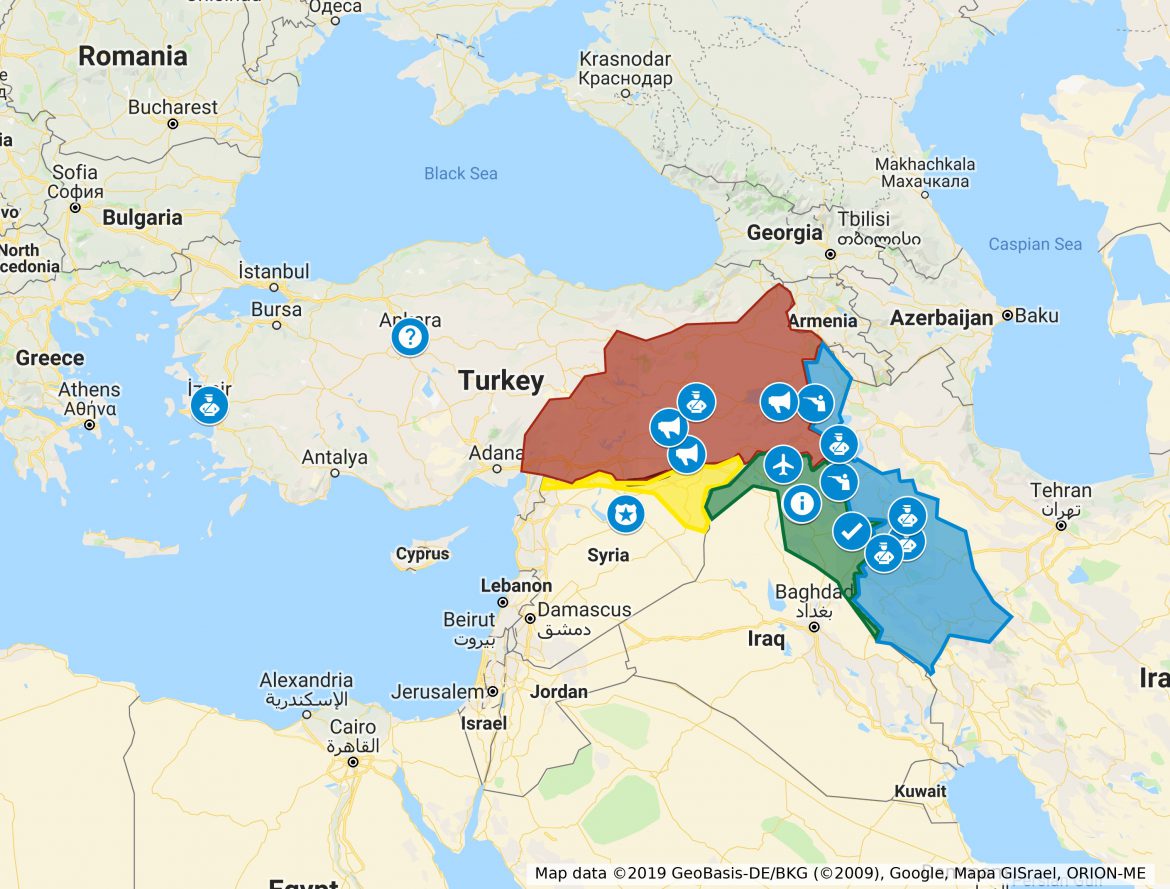987
Iran
- Iranian security forces continued to target Kurdish border porters (Kolbars) last week. On Friday, Iranian border guards opened fire on a group of Kolbars and severely injured one. Also, on Friday, a 25-year old Kurd named Mohammed Hadizada was seriously wounded in the Qotur District of Khoy city. On Sunday, Iranian Revolutionary Guards killed a Kurdish shepherd in the same area. Meanwhile, Iranian security forces killed a Kurdish businessman, Adris Waissi, who was working with Kolbars near Piranshahr. Since the beginning of 2019, the Iranian regime has killed 51 Kolbars and injured at least 102.
- The Iranian regime continued its campaign of arrest and imprisonment targeting Kurdish activists during the week of 9/08-09/15. In Sanandaj, Iranian security forces detained a Kurdish labor activist named Nabzan Kianpour. Concurrently, an Islamic Revolutionary Court in Sanandaj sentenced a Kurdish man named Afshar Fathi to six years in prison on charges of “membership in a Kurdish opposition party.” In Divandar, Iranian intelligence officers (Ettela’at) detained a Kurdish member of a local council named Amir Khani. No further information was released regarding Khani’s detention. At the same time, Iranian authorities in Urmia jailed a Kurd from Bokan and another from Urmia city for “membership in an anti-state organization.” The two Kurds, Naser Khadami and Naser Mohammed, were initially arrested at the end of August. In Pawa, a local Kurdish environmental activist Irfan Rashidi was sentenced to a year in prison and received a two-year ban on activism. According to the Kurdistan Human Rights Association (KMMK), 280 Kurds have been detained this year for political activism.
Iraq
- The Kurdistan Regional Government (KRG) is set to send a delegation to the Government of Iraq to discuss Baghdad’s allocated budget for Iraqi Kurdistan. The KRG delegation is comprised of officials from the Ministries of Planning and Finance. The KRG also intends to “invite Iraq’s finance, oil and gas, and legal parliamentary committees for further in-depth discussions.” Iraq is now demanding revenues from 250,000 barrels of oil the KRG has exported to address Iraqi Kurdistan’s financial needs, though Baghdad has failed to send appropriate funds to the KRG for this purpose since 2014.
- The Change Party (Gorran) held internal elections and reelected its leader Omar Saed Ali. Gorran holds its party congress every two years in Sulaymaniyah. Meanwhile, the Patriotic Union of Kurdistan (PUK) plans to hold its first party congress since 2010 on December 7. Iraqi law requires all political parties to hold regular internal elections to participate in the general elections.
- The Kurdistan Democratic Party (KDP) appointed a new governor, Farsat Sofi, to replace Nowzad Hadi. Hadi had served as governor since 2004 and was also a member of the KDP.
- The Turkish military continued its incursion into Iraqi Kurdistan last week. Turkish airstrikes struck several locations in Qandil, the Choman District, and Amedi, resulting in additional civilian displacement and large fires which have affected local forests and farmlands. Turkish air and artillery strikes in Iraqi Kurdistan have resulted in the deaths of dozens of civilians since Turkey launched Operation Claw to target the Kurdistan Workers’ Party (PKK) headquarters in the Qandil mountains on May 28, 2019.
Syria
- The U.S. and Turkey continued efforts to establish a Security Mechanism between Turkey and Syria’s Kurdish region (Rojava). The Kurdish-led Syrian Democratic Forces withdrew YPG personnel and heavy weapons from the proposed Security Mechanism area while joint U.S.-Turkey patrols took place near the Kurdish towns of Serekaniye and Giri Spi. Though the U.S.-led coalition claimed there was “good progress” regarding the establishment of a buffer zone in northeast Syria, Turkish President Recep Tayyip Erdogan renewed threats to invade the Kurdish region if a satisfactory agreement was not reached with the U.S. within two weeks. Erdogan’s remarks came after a summit was held in Ankara with Iranian and Russian leaders to discuss the fate of Syria. Prior to the summit, the Ministry of Foreign Affairs and Expatriates of the Syrian Arab Republic released a statement describing the SDF as “separatist terrorists.” In response, the Kurdish led Syrian Democratic Council (SDC) described the statement as coinciding with the summit hosted by Erdogan. The SDC statement also said “a failed statement as if it speaks of another region and another logic that does not apply at all to our regions. We regret the fate of the Syrian state in light of this mindset that it manages.”
- The SDF killed two ISIS (Da’esh) terrorists and arrested ten during raids in Deir ez-Zor al-Shadadi, Al Tabqa, and Al Raqqa. Also, in Deir ez-Zor, local security forces defused a Da’esh truck bomb containing around 1000 pounds of C-4 explosive.
Turkey
- The Appeals Court of Ankara reaffirmed a release order for the jailed Kurdish politician Selahattin Demirtash. The court had previously ordered all terrorism-related charges be dropped against the former pro-Kurdish Peoples’ Democratic Party (HDP) leader. Demirtas was jailed during a 2016 purge which targeted Erdogan’s political opponents throughout the country, though his lawyers claim he could soon be released.
- For the fourth week in a row, Kurdish protesters took to the streets to protest the government’s dismissal of Kurdish mayors in Mardin, Van, and Diyarbakir. Concurrently, the Turkish government continued its political purge by removing and detaining two more co-mayors of the Kulp District in Diyarbakir last week. The mayors, Mehmet Fatih Tas and Fatma Ay, were HDP members elected in March’s local election and, as in previous cases, were replaced with government appointed trustees. Meanwhile, Turkish security forces detained a number of Kurdish youths in several cities. In Izmir, seven people were arrested on Thursday while ten people remained jailed by in Van after their arrest last Tuesday.

